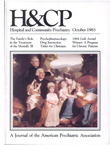Developing and Assessing a Training Program in Prehospital Care of Behavioral Emergencies
Abstract
Did we achieve our training objectives? The written test suggested that significant learning did occur. However, these results should be viewed with caution. We attempted to do a three-month follow-up posttest, but our rate of return was too small to analyze. Also, the resuits of the field performance study indicate a significant improvement in only two skills: EMTs commenting on the patients' problems and saying goodbye to patients.
Because of the large numbers of participants at the Boston workshop, it consisted primarily of lectunes and large-group discussions and minimal interaction between the trainees and faculty. Also, there were few opportunities to practice the skills discussed in the workshop. However, in Essex Junction, the smaller numbers helped to correct these deficiencies. Although this did not change the overall results of the test scores, it probably accounted for the higher posttest scores in Essex Junction.
As a result of our findings, we revised the pilot course to emphasize a small-group seminar format with opportunities for practicing skills through role-playing exercises and small-group discussions. Our experience suggests that intensive training of this type can help prehospital caretakers provide more effective care to acutely distressed emergency patients.
Access content
To read the fulltext, please use one of the options below to sign in or purchase access.- Personal login
- Institutional Login
- Sign in via OpenAthens
- Register for access
-
Please login/register if you wish to pair your device and check access availability.
Not a subscriber?
PsychiatryOnline subscription options offer access to the DSM-5 library, books, journals, CME, and patient resources. This all-in-one virtual library provides psychiatrists and mental health professionals with key resources for diagnosis, treatment, research, and professional development.
Need more help? PsychiatryOnline Customer Service may be reached by emailing [email protected] or by calling 800-368-5777 (in the U.S.) or 703-907-7322 (outside the U.S.).



